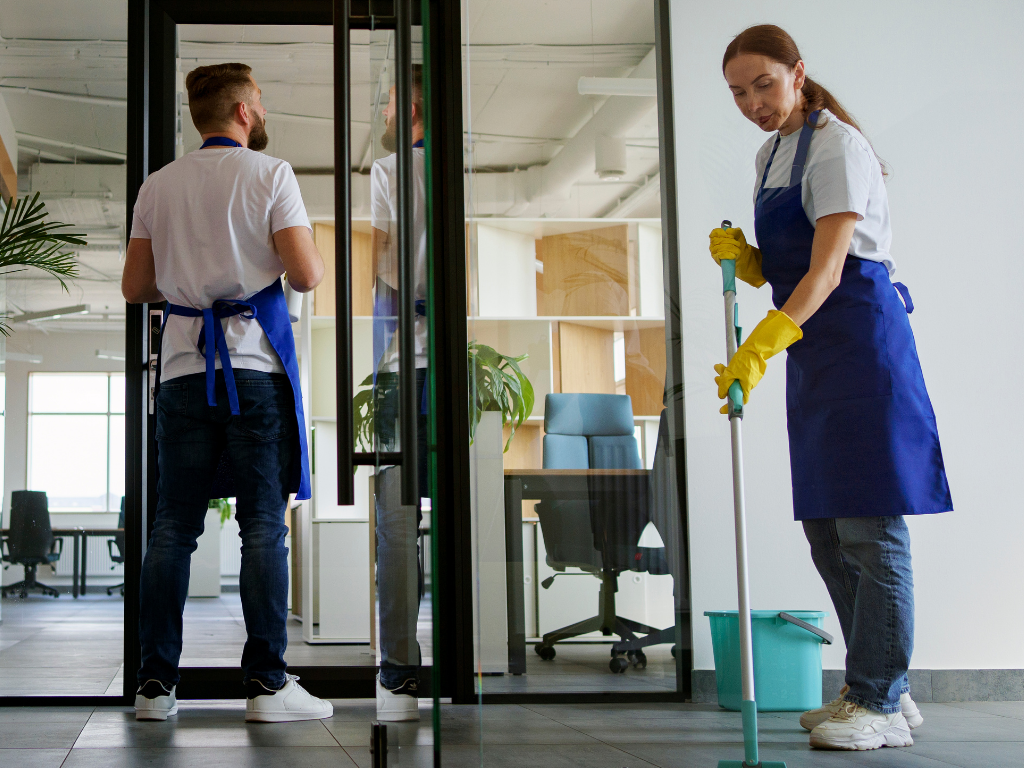Outsourcing has become a common practice in today’s business landscape, with companies often relying on external service providers to handle non-core functions such as cleaning services. In the cleaning industry, outsourcing involves hiring specialized cleaning companies to manage janitorial duties, facility maintenance, and other cleaning-related tasks. While outsourcing offers several potential benefits, including cost savings and access to expertise, its impact on cleaning service quality is a topic of interest and debate.
Outsourcing in the cleaning service industry encompasses various arrangements, from simple contracts for specific cleaning tasks to comprehensive agreements covering multiple locations and services. This article delves into the complexities of outsourcing in the cleaning sector, examining how different outsourcing models and approaches can influence the quality of cleaning services provided. By exploring the factors that contribute to service quality and the strategies for maintaining high standards, we aim to provide insights into the impact of outsourcing on cleaning service quality and offer practical recommendations for businesses seeking to optimize their cleaning operations.
Understanding the Impact Of Outsourcing on Cleaning Service

Outsourcing refers to the practice of contracting out specific business functions or processes to external vendors or service providers. In the context of the cleaning service industry, outsourcing involves businesses entrusting cleaning responsibilities to third-party cleaning companies. This arrangement allows companies to focus on their core operations while leveraging the expertise and resources of specialized cleaning service providers.
Outsourcing in the cleaning service industry can take various forms, including selective outsourcing of specific cleaning tasks or comprehensive agreements covering all cleaning-related services. Companies may choose to outsource cleaning services for reasons such as cost-effectiveness. Access to specialized expertise, and flexibility in staffing and resource allocation. Understanding the different types of outsourcing arrangements and their implications is essential for businesses seeking to make informed decisions about their cleaning operations.
Factors Influencing Cleaning Service

Several factors contribute to the quality of cleaning services, regardless of whether they are performed in-house or outsourced. The training and expertise of cleaning staff play a crucial role in determining the effectiveness and efficiency of cleaning operations. Additionally, quality control measures implemented by cleaning companies, such as inspection protocols and performance evaluations, are essential for maintaining consistent service quality.
Technology and equipment also play a significant role in influencing cleaning service quality. The use of advanced cleaning technologies and equipment can enhance efficiency, effectiveness, and the overall quality of cleaning outcomes. Moreover, communication and feedback mechanisms between clients and cleaning service providers are critical for addressing any issues or concerns promptly and ensuring that cleaning services meet or exceed client expectations.
Impact of Outsourcing on Cleaning Service Quality
The impact of outsourcing on cleaning service quality can vary depending on various factors, including the outsourcing arrangement, the capabilities of the service provider, and the level of oversight and management provided by the client. While outsourcing can lead to significant improvements in service quality by leveraging the expertise and resources of specialized cleaning companies, it can also pose challenges such as communication gaps, inconsistent performance, and reduced control over the cleaning process.
The decision to outsource cleaning services can have far-reaching implications for service quality and customer satisfaction. Businesses must carefully evaluate the potential benefits and drawbacks of outsourcing and implement strategies to mitigate any negative impacts on service quality. By understanding the factors that influence service quality and proactively addressing them. Businesses can maximize the benefits of outsourcing while ensuring that cleaning standards are maintained or improved.
Strategies for Maintaining Quality in Outsourced Cleaning Services
To mitigate the potential negative impacts of outsourcing on cleaning service quality, businesses can implement several strategies:
- Clear Communication and Expectations: Establishing clear communication channels and expectations with the service provider is essential for ensuring that both parties are aligned on service requirements, standards, and performance expectations. Regular meetings and check-ins can help address any issues or concerns promptly and ensure that cleaning services meet or exceed client expectations.
- Regular Monitoring and Evaluation: Implementing a robust monitoring and evaluation process allows businesses to assess the performance of outsourced cleaning services regularly. This may involve conducting site inspections, reviewing service reports, and soliciting feedback from employees and facility occupants. By monitoring key performance indicators and addressing any deficiencies promptly, businesses can maintain high cleaning standards and service quality.
- Training and Development Programs: Providing training and development opportunities for outsourced cleaning staff can enhance their skills,
- knowledge, and professionalism. Training programs may cover topics such as cleaning techniques, safety protocols, customer service, and the use of cleaning equipment and technologies. Investing in the professional development of cleaning staff can lead to improved service quality and customer satisfaction.
- Flexibility and Adaptability: Maintaining flexibility and adaptability in outsourcing arrangements allows businesses to respond effectively to changing cleaning needs and requirements. This may involve adjusting service schedules, reallocating resources, or implementing new cleaning protocols in response to feedback or changing circumstances. By remaining responsive to client needs and preferences, businesses can ensure that cleaning services continue to meet evolving standards and expectations.
Leveraging Green Cleaning Practices
As environmental awareness continues to rise, businesses are increasingly turning to green cleaning practices to minimize their ecological impact while maintaining high cleaning standards. Outsourcing cleaning services to companies that prioritize environmentally friendly cleaning products and methods offers numerous benefits. Which includes improved indoor air quality, reduced exposure to harmful chemicals, and enhanced sustainability credentials. By partnering with green cleaning providers. Businesses can demonstrate their commitment to environmental stewardship while ensuring that their facilities are clean, safe, and healthy for occupants.
Green cleaning practices involve the use of non-toxic, biodegradable cleaning agents, as well as energy-efficient cleaning equipment and procedures. Outsourced cleaning companies that specialize in green cleaning are often certified by recognized sustainability organizations and adhere to strict environmental standards. By leveraging green cleaning practices, businesses can reduce their environmental footprint. Lower operating costs, and create a healthier work environment for employees and customers alike.
Embracing Technology for Enhanced Efficiency
Innovations in cleaning technology have revolutionized the cleaning industry, offering new opportunities for improved efficiency, effectiveness, and quality of service. Outsourcing cleaning services to companies that embrace technology-driven solutions can lead to significant enhancements in cleaning outcomes and operational efficiency. From robotic cleaners that automate routine tasks to UV disinfection devices that eliminate harmful pathogens, technology-enabled cleaning solutions are reshaping the way cleaning services are delivered.
By outsourcing cleaning services to companies that leverage cutting-edge technologies, businesses can benefit from faster turnaround times, reduced labor costs, and superior cleaning results. Technology-driven cleaning solutions not only improve cleaning efficiency. But also enhance the overall cleanliness and hygiene of facilities, contributing to a safer and healthier environment for occupants. As technology continues to advance, outsourcing cleaning services to companies at the forefront of innovation is essential for staying competitive and meeting the evolving needs of modern businesses.
Conclusion
In conclusion, outsourcing has a significant impact on cleaning service quality in the commercial cleaning industry. While outsourcing can lead to improvements in service quality by leveraging the expertise and resources of specialized cleaning companies, it can also pose challenges such as communication gaps and loss of control over cleaning operations.
However, by implementing strategies such as clear communication, regular monitoring, training and development, and flexibility, businesses can mitigate these challenges and maintain high cleaning standards. By striking the right balance between outsourcing benefits and quality assurance measures, businesses can optimize their cleaning operations and provide a clean, safe, and healthy environment for employees, customers, and visitors.

